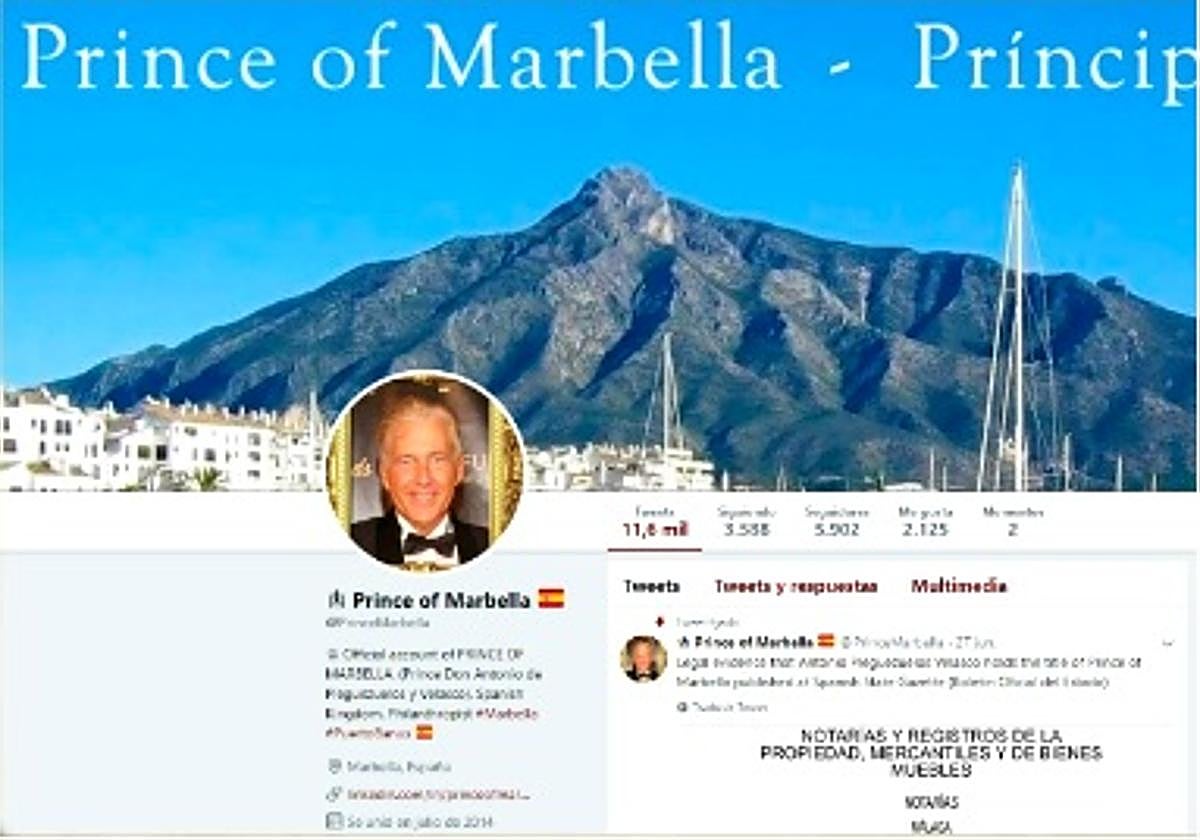'Prince of Marbella' acquitted of falsifying his title and posing as fake royalty
However, the notary who signed the deed eight years ago was convicted by the court for not carrying out the required due diligence
A self-declared 'prince of Marbella' has been acquitted for posing as fake royalty, creating a website displaying fictitious ambassadors, and professing plans to create his own currency.
While Antonio Pleguezuelos Velasco walked free from court, the notary who attested to the forging of his title was convicted. The notary was slapped with an eight-month fine (3,600 euros) and the false prince to a five-month fine (2,250 euros).
While the High Court of Justice of Andalusia (TSJA) revoked the conviction of Antonio Pleguezuelos, it found the notary negligent for their actions.
On 16 December 2016, the notary "at the request of Antonio Pleguezuelos" drew up an act of notoriety in which it was stated that Antonio Pleguezuelos held the "title of prince of Marbella as a royal dignity of the Kingdom of Spain for life", according to the the court ruling.
The notary accepted the proposal. Court documents show Antonio Pleguezuelos then asked the notary to publish an announcement in Spain's Official State Gazette (BOE) of his title. On 30 December 2016, a notice of notification dated 28 December 2016 was published in the BOE.
The attribution of a Spanish royal title is "exclusively" done by the monarchy - it has always been granted by the King and Queen throughout history - and its accreditation is only possible through the "royal letter of grant of succession" signed by the King and co-signed by the minister of justice, "documentation that in no case was provided", the court ruled.
Despite his status as a notary, the convicted person "flagrantly, thoughtlessly and unjustifiably violated the required diligence", according to the court ruling, as "he neither checked nor accredited the existence of the authentication of the title of the 'prince of Marbella'".
The notary did not request a supporting letter from his client either, but merely drew up the notoriety deed, and published it in the official gazette, "legitimising a non-existent title". Pleguezuelos had even gone to another notary's office in Marbella where, after studying the matter, the notary informed him of the "legal unfeasibility" of carrying out the deed. When he asked him to publish the declaration in the BOE, the other notary refused on the grounds there was no legal basis for such a request, the court heard.
The notary's defence argued the misuse of a title of royalty does not constitute a crime under the current penal code. The High Court, however, ruled that the notary agreeing to Pleguezuelos' claim that he is the prince of Marbella is punishable as it was "something that was evidently not true, as the applicant does not hold any title belonging to Spanish royalty".
The ruling, judged by Julio Ruiz-Rico, warned of the risk involved in publicly attesting to the title: "It is easy to imagine the public and even legal significance that such a declaration could have".
According to the ruling, Pleguezuelos even used photographs of the throne room of the Royal Palace on his website. The supposed royal title was in accordance with Royal Decree 1368/1987, of 6 November, according to his website.
Lawyer Pedro Yarza Mayorga, who represented the fake prince of Marbella in the trial, was satisfied with the acquittal of his client after arguing that it was impossible for Pleguezuelos to be a co-operator in the crime of false documentation. "His only intention was to honour the Spanish Crown and represent Marbella in the world. [Pleguezuelos] has always been a very royalist person."

